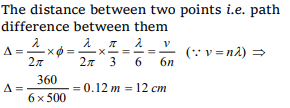1.A wave of frequency 500 Hz has velocity 360
m/sec. The distance between two nearest points
60° out of phase, is
a) 0.6 cm
b) 12 cm
c) 60 cm
d) 120 cm
Explanation:

2. The following phenomenon cannot be observed
for sound waves
a) Refraction
b) Interference
c) Diffraction
d) Polarisation
Explanation: Sound waves are longitudinal in nature so they can not be polarised
3.When an aeroplane attains a speed higher than
the velocity of sound in air, a loud bang is heard.
This is because
a) It explodes
b) It produces a shock wave which is received as
the bang
c) Its wings vibrate so violently that the bang is
heard
d) The normal engine noises undergo a Doppler
shift to generate the bang
Explanation: It produces a shock wave which is received as the bang
4. Ultrasonic waves are those waves
a) To which man can hear
b) Man can't hear
c) Are of high velocity
d) Of high amplitude
Explanation: Ultrasonic waves are those of higher frequencies than maximum audible range frequencies (audible range of frequencies is 20 Hz to 20000 Hz)
5. A big explosion on the moon cannot be heard on
the earth because
a) The explosion produces high frequency sound
waves which are inaudible
b) Sound waves required a material medium for
propagation
c) Sound waves are absorbed in the moon's
atmosphere
d) Sound waves are absorbed in the earth's
atmosphere
Explanation: Sound waves required a material medium for propagation
6. Sound waves of wavelength greater than that of
audible sound are called
a) Seismic waves
b) Sonic waves
c) Ultrasonic waves
d) Infrasonic waves
Explanation: Infrasonic waves have frequency less than (20 Hz) audible sound and wavelength more than audible sound.
7. ‘SONAR’ emits which of the following waves
a) Radio waves
b) Ultrasonic waves
c) Light waves
d) Magnetic waves
Explanation: SONAR emits ultrasonic waves.
8.Which of the following do not require medium for
transmission
a) Cathode ray
b) Electromagnetic
wave
c) Sound wave
d) None of the above
Explanation: EM waves do not requires medium for their propagation.
9.Consider the following
I. Waves created on the surfaces of a water pond
by a vibrating sources.
II. Wave created by an oscillating electric field in
air.
III. Sound waves travelling under water.
Which of these can be polarized
a) I and II
b) II only
c) II and III
d) I, II and III
Explanation: II only
10.Mechanical waves on the surface of a liquid are
a) Transverse
b) Longitudinal
c) Torsional
d) Both transverse and longitudinal
Explanation: Both transverse and longitudinal